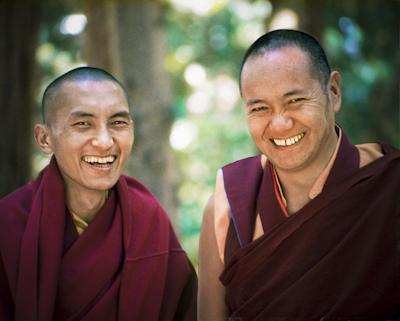E-letter No. 1: February 2003

Dear Friend,
Thanks for joining the Lama Yeshe Wisdom Archive monthly e-letter list. Every month we would like to send a short, previously unpublished teaching by Lama Yeshe or Lama Zopa Rinpoche, like the one below, to your email address, along with any Archive news that we think may be of interest to you.
For example, we have just published a fantastic new free book that we are making available around the world: His Holiness the Dalai Lama's "Illuminating the Path to Enlightenment," a 250-page commentary on Atisha's "Lamp for the Path" and Lama Tsongkhapa's "Lines of Experience." You can see and order it on our Web site, where you will also find many other wonderful teachings and links to other great Dharma sites.
If you would like to let others know about this excellent opportunity, please forward them this message and ask them to contact us at [email protected] or send us their email address.
Thank you so much for your kind interest.
Much love,
Nick Ribush
Director
What Buddhism's About
Some people think they know all about Buddhism and Buddhists just because they've read a couple of books. They pick one up, "Hmm. Let's see what this book says. Well, according to this it seems that Buddhists are really extreme. They believe in all sorts of strange stuff." They pick up another: "My goodness, Buddhists are completely nihilistic." They draw all sorts of wrong conclusions based on extremely limited information; they don't see anything like the whole picture. This is very dangerous.
Perhaps they read something from the Madhyamaka school of Buddhist philosophy, which is known for its rigorous intellectual approach to the subject of emptiness, the ultimate nature of reality, and can be very difficult to understand. This can lead them to think, "Oh, Buddhists aren't religious; they're atheists. They don't believe anything; they think that nothing exists. How can they consider themselves religious?" This too can be very dangerous. Other people might conclude, "Wow! Buddhists believe in three Gods. They say Buddha is one God; Dharma is another; Sangha a third. They must be super-believers. That's too much. In the West, we've never heard of such a thing as three Gods; only one. We're religious, but we only have one God. We can't even agree with the Buddhists on how many Gods there are."
If you look at just one tiny aspect of Buddhism, of course it might appear too much for you. But Buddhism is not just about one or two small things; it is not some tiny philosophy. Lord Buddha explained the nature of every single phenomenon in the universe.
At this stage, I have had about nine or ten years' experience teaching Buddhist philosophy to Westerners and experimenting with how it fits their minds, mainly in the one-month meditation courses we hold each year at Kopan Monastery in Nepal. In these courses we try to explain everything, but I have found that if we talk too much about the negative side of things, students completely freak out. Not all of them, but many do. They say, "These lamas emphasize the negative too much. Why don't they talk more about the positive? Buddhism isn't only about delusion and suffering. Why do they teach us this negative stuff day after day?" But the thing about Buddhism is that before you can put yourself into the positive path to liberation, enlightenment or God--whatever you want to call it, the name doesn't matter--you have to know how your negative mind works.
If you don't understand how the two extreme negative views of overestimation and underestimation function within you, how can you correct your actions and put yourself into the right path? Therefore, it is crucial to know the negative aspects of your nature. Actually, if you comprehend the evolution of your negative mind from beginning to end, you'll feel very comfortable. Conversely, if you don't know how it works, you'll finish up thinking that negative actions are positive.
Moreover, if you try to practice the path to liberation without a solid grounding in what is positive and what is negative, a simple question from someone challenging what you are doing can completely derail you. You might get confused and give up. That's the sign of a weak mind. You have to see the totality of the evolution of both the negative and the positive mind. Some people assume that Buddhism is probably a nice religion that always talks diplomatically and sweetly about holy things. When we start teaching Buddhism to beginners, we don't begin by talking about holy things. The first thing we explain is the basic nature of your present mind--what's going on down here, right now--not Buddha up there.
Lama Yeshe gave this teaching at Melbourne University in April 1975. Edited by Nicholas Ribush. Read the rest of this teaching in Chapter One of The Peaceful Stillness of the Silent Mind.
